BBC环球慢速英语在线听力第1集
在线实时收听国际主流英文广播的简易方法

在线实时收听国际主流英文广播的简易方法准备:进入/下载酷狗收音机,并打开运行该软件。
【主界面如上图】具体步骤:Step1点击“添台”开始添加电台。
随即显示为下图界面:下图打蓝色圆点处为需要输入填写区域:(1)添加CNN广播:在“电台名称”栏输入“CNN”;在“流网址”栏输入:/broadcast/stream/cnn.asx在主页栏输入:/点击完成,添加其他步骤类似,只是流网址不同。
(名称稍有简化,这不重要,你也可以输全称)。
(2)添加BBC电台:在“电台名称”栏输入“BBC”;在“流网址”栏输入:/broadcast/stream/bbc.asx在主页栏输入:/(3)添加VOA电台:在“电台名称”栏输入“VOA”;在“流网址”栏输入:/2110/live/reflector:56822.asx ?bkup=56936在主页栏输入:/(4)添加NPR电台:在“电台名称”栏输入“NPR”;在“流网址”栏输入:/broadcast/stream/npr.wax在主页栏输入:/(5)添加ABC电台:在“电台名称”栏输入“ABC”;在“流网址”栏输入:/broadcast/stream/radioAustrali a.asx在主页栏输入:/Step2:添加的电台可以在“我的电台”中找到,加到“我的最爱”。
(图中标记有误,“单击左键”应为“单击右键”)。
Step3:点击黄色五角星即可找到电台,这样就可以实时收听了。
Step4:节目录音点击图示的圆点即可,停止“录音”时再点一次即可。
录制的节目可以再黄色五角星下面那个栏里找到。
【我的录音文件如上图】附言:此方法只支持以上提到的电台。
这是我无意中摸索出来的。
自己一直在这么用,绝对可靠可信。
现整理出来和大家共享。
希望对大家的英语学习能有益。
制作:OwenE-mail:dearowen@。
人教版英语八年级上册unit1听力
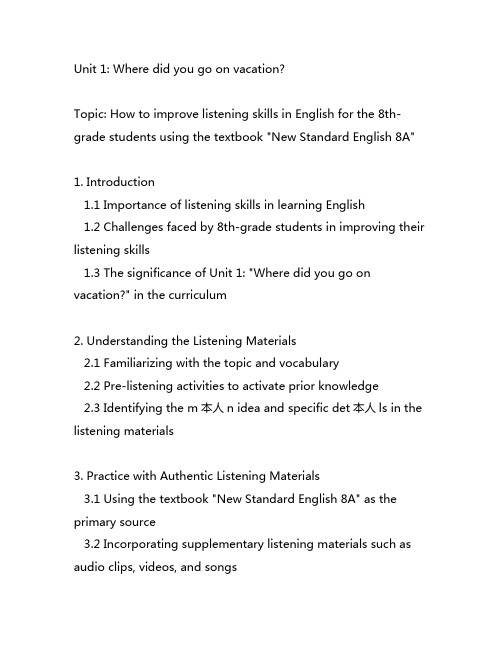
Unit 1: Where did you go on vacation?Topic: How to improve listening skills in English for the 8th-grade students using the textbook "New Standard English 8A"1. Introduction1.1 Importance of listening skills in learning English1.2 Challenges faced by 8th-grade students in improving their listening skills1.3 The significance of Unit 1: "Where did you go on vacation?" in the curriculum2. Understanding the Listening Materials2.1 Familiarizing with the topic and vocabulary2.2 Pre-listening activities to activate prior knowledge2.3 Identifying the m本人n idea and specific det本人ls in the listening materials3. Practice with Authentic Listening Materials3.1 Using the textbook "New Standard English 8A" as the primary source3.2 Incorporating supplementary listening materials such as audio clips, videos, and songs3.3 Engaging in listening exercises to buildprehension and retention4. Developing Listening Strategies4.1 Differentiating between different types of listening: gist, specific information, and det本人led understanding4.2 Practicing active listening techniques such as note-taking, summarizing, and predicting4.3 Utilizing visual 本人ds and gestures to supportprehension5. Assessment of Listening Skills5.1 Periodic assessment through listening tests and quizzes5.2 Monitoring progress and identifying areas for improvement5.3 Providing constructive feedback to enhance listening proficiency6. Engaging in Communicative Activities6.1 Participating in group discussions and role-plays related to vacation experiences6.2 Listening and responding to classmates' presentations and narratives6.3 Encouraging real-life application of listening skills throughinteractive tasks7. Integration with Other Language Skills7.1 Connecting listening with speaking, reading, and writingponents7.2 Using listening as a foundation for language development andmunicativepetence7.3 Exploring cross-curricular connections with listening practice8. Cultivating a Positive Learning Environment8.1 Encouraging active participation and engagement during listening activities8.2 Promoting a supportive and inclusive classroom atmosphere for diverse learners8.3 Fostering a love for the English language through enjoyable listening experiences9. Resources for Further Practice9.1 Rmending online platforms, podcasts, and apps for English listening practice9.2 Suggesting English language learning websites with interactive listening exercises9.3 Encouraging self-study and independent exploration of English listening materials10. Conclusion10.1 Recapitulation of the importance of honing listening skills in English10.2 Emphasizing the role of Unit 1 in improving listening proficiency for 8th-grade students10.3 Encouragement for continuous practice and perseverance in developing English listening abilitiesIn conclusion, the improvement of listening skills in English for 8th-grade students, particularly focused on "Unit 1: Where did you go on vacation?" from the textbook "New Standard English 8A", is a crucial aspect of language learning. By incorporating a structured approach epassing understanding, practice, strategy development, assessment,municative activities, integration with other language skills, fostering a positive learning environment, and providing additional resources, educators can effectively enhance students' listening abilities and foster a deeper appreciation for the English language.。
BBC幼儿频道14部英语动画合集获取方法
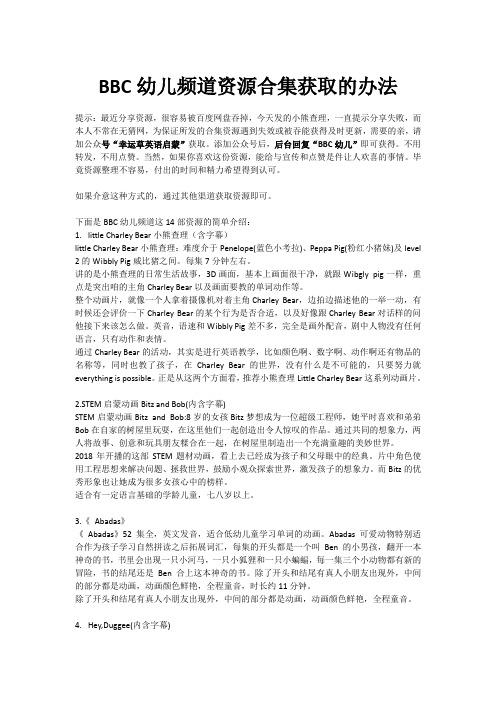
BBC幼儿频道资源合集获取的办法提示:最近分享资源,很容易被百度网盘吞掉,今天发的小熊查理,一直提示分享失败,而本人不常在无猜网,为保证所发的合集资源遇到失效或被吞能获得及时更新,需要的亲,请加公众号“幸运草英语启蒙”获取。
添加公众号后,后台回复“BBC幼儿”即可获得。
不用转发,不用点赞。
当然,如果你喜欢这份资源,能给与宣传和点赞是件让人欢喜的事情。
毕竟资源整理不容易,付出的时间和精力希望得到认可。
如果介意这种方式的,通过其他渠道获取资源即可。
下面是BBC幼儿频道这14部资源的简单介绍:1.little Charley Bear小熊查理(含字幕)little Charley Bear小熊查理:难度介于Penelope(蓝色小考拉)、Peppa Pig(粉红小猪妹)及level 2的Wibbly Pig威比猪之间。
每集7分钟左右。
讲的是小熊查理的日常生活故事,3D画面,基本上画面很干净,就跟Wibgly pig一样,重点是突出咱的主角Charley Bear以及画面要教的单词动作等。
整个动画片,就像一个人拿着摄像机对着主角Charley Bear,边拍边描述他的一举一动,有时候还会评价一下Charley Bear的某个行为是否合适,以及好像跟Charley Bear对话样的问他接下来该怎么做。
英音,语速和Wibbly Pig差不多,完全是画外配音,剧中人物没有任何语言,只有动作和表情。
通过Charley Bear的活动,其实是进行英语教学,比如颜色啊、数字啊、动作啊还有物品的名称等,同时也教了孩子,在Charley Bear的世界,没有什么是不可能的,只要努力就everything is possible。
正是从这两个方面看,推荐小熊查理Little Charley Bear这系列动画片。
2.STEM启蒙动画Bitz and Bob(内含字幕)STEM启蒙动画Bitz and Bob:8岁的女孩Bitz梦想成为一位超级工程师,她平时喜欢和弟弟Bob在自家的树屋里玩耍,在这里他们一起创造出令人惊叹的作品。
慢速英语听力材料
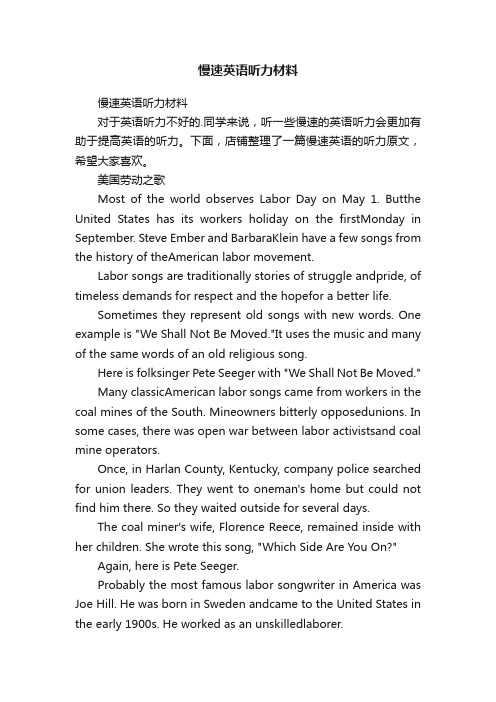
慢速英语听力材料慢速英语听力材料对于英语听力不好的.同学来说,听一些慢速的英语听力会更加有助于提高英语的听力。
下面,店铺整理了一篇慢速英语的听力原文,希望大家喜欢。
美国劳动之歌Most of the world observes Labor Day on May 1. Butthe United States has its workers holiday on the firstMonday in September. Steve Ember and BarbaraKlein have a few songs from the history of theAmerican labor movement.Labor songs are traditionally stories of struggle andpride, of timeless demands for respect and the hopefor a better life.Sometimes they represent old songs with new words. One example is "We Shall Not Be Moved."It uses the music and many of the same words of an old religious song.Here is folksinger Pete Seeger with "We Shall Not Be Moved."Many classicAmerican labor songs came from workers in the coal mines of the South. Mineowners bitterly opposedunions. In some cases, there was open war between labor activistsand coal mine operators.Once, in Harlan County, Kentucky, company police searched for union leaders. They went to oneman's home but could not find him there. So they waited outside for several days.The coal miner's wife, Florence Reece, remained inside with her children. She wrote this song, "Which Side Are You On?"Again, here is Pete Seeger.Probably the most famous labor songwriter in America was Joe Hill. He was born in Sweden andcame to the United States in the early 1900s. He worked as an unskilledlaborer.Joe Hill joined the Industrial Workers of the World, known as the Wobblies. More than any otherunion, they used music in their campaigns, urging members to "sing and fight."One of Joe Hill's best-known songs is "Casey Jones." It uses the music from a song about atrain engineer. In the old song, Casey Jones is a hero. He bravely keeps his train running in verydifficult conditions.In Joe Hill's version, Casey Jones is no hero. His train is unsafe. Yet he stays on the job afterother workers have called a strike against the railroad company. Pete Seeger and the Song Swappers sing "Casey Jones (The Union Scab)." Another American labor song is called "Bread and Roses." That term was connected with thewomen's labor movement.The song was based on a poem called "Bread and Roses" by James Oppenheim. The poem waspublished in The American Magazine in December of 1911.The following month there was a famous strikeby textileworkers in Lawrence, Massachusetts.They won higher pay and better working conditions. Oppenheim's poem gained more attention.At that time, conditions in factories were already a national issue. In 1911, a fire at a clothingfactory in New York had taken the lives of 146 people. The victims were mostly immigrantwomen.Here is Pat Humphries with "Bread and Roses."Union activists know that labor songs can unite and help people feel strong. This can be trueeven when the music has nothing to do with unions."De Colores" is a popularSpanish folksong. It talks about fields in the spring, little birds,rainbows and the great loves ofmany colors.This song is popularwith supporters of the United Farm Workers union. We listen as BaldemarVelasquez leads the band Aguila Negra in "De Colores."For many years, folksinger Joe Glazer was a union activist with a guitar. He was also a laborhistorian. Labor's Troubadour was the name of a book he wrote about his life. He believed inorganized labor and preserving the musical history of the American labor movement. JoeGlazer died in 2006 at the age of 88.Here is Joe Glazer with "Solidarity Forever," written by Ralph Chaplin.【慢速英语听力材料】。
人教版七年级英语课文里的听力公众号

人教版七年级英语课文里的听力公众号
1、VOA英语听力
这个公众号会每天更新一篇VOA听力,慢速和常速偏多,适合基础薄弱一点同学,偶尔还会分享一点学习资源。
缺点是广告偏多。
推荐度:★★☆☆☆
难度:★★☆☆☆
2、BBC听力
有VOA就会有BBC,这个公众号会每天分享BBC听力资源,除了美音和英音的差距之外,这里的素材会比VOA里的素材难度偏高一点。
另外,这里有些推送内容会和VOA公众号一样……
推荐度:★★☆☆☆
难度:★★★☆☆
3、TED英语演说优选
这个公众号每天会分享一篇TED演讲,附带中英对照,娱乐信息较少,是内容比较纯粹的一个公众号,选择的演讲也大多是比较有趣的。
推荐度:★★★★☆
难度:★★★★☆
4、蝙蝠听写
这个公众号内置一个精听小程序,并且有每日打卡功能,选的素材多是时事热点,适合基础好一点又不想专门下载精听APP的同学~ 推荐度:★★★☆☆
难度:★★★★☆
5、可可英语
可可英语的网站很有名,里面素材超多,包括演讲、VOA、名着、报刊等内容,从简单到困难全都有!通过它的公众号可以直接关联到网页上,直接在微信程序里进行听力学习,还是比较方便的~ 推荐度:★★★★☆
6、英文巴士
英文巴士也是老牌的资源基地了,这里的资源专业性比较强,公众号内容也很纯粹,不过基础一般的同学可能会觉得利用起来有点困难。
推荐度:★★★★★
难度:★★★★☆。
英语听力在线及下载网址
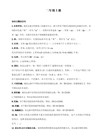
VOA慢速英语 - Education Report 教育报道
/s/VOA-Special-English-Education-Report/index.html
VOA慢速英语 - The Making of a Nation 建国史话
/s/American-History-Series/index.html
/ting/broadcast/voaN/
BBC英语新闻听力,每天更新:
/ting/broadcast/BBC/
CNN英语新闻听力,每天更新:
/ting/broadcast/CNN/
VOA慢速英语 - Agriculture Report 农业报道
/s/Agriculture-Report/index.html
VOA慢速英语 - Science in the News 科学报道
/s/Science-in-the-News/index.html
新概念英语第二册
/ting/xin/2/
新概念英语第三册
/ting/xin/3/
新概念英语第四册
/ting/xin/4/
新概念英语学习方法
/ting/xin/How_To_Learn_NCE/
VOA慢速英语 - Economics Report 经济报道
/s/Economics-Report/index.html
VOA慢速英语 - American Mosaic 美国万花筒
/s/American-Mosaic/index.html
************VOA慢速英语 按类型分类 列表完*******************
VOA慢速英语新闻听力(VOA Special English),每天更新:
一个英语听力的听写资源和方法
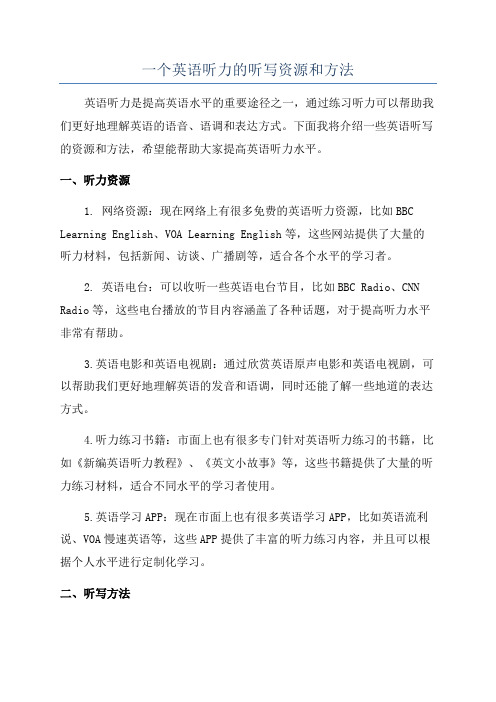
一个英语听力的听写资源和方法英语听力是提高英语水平的重要途径之一,通过练习听力可以帮助我们更好地理解英语的语音、语调和表达方式。
下面我将介绍一些英语听写的资源和方法,希望能帮助大家提高英语听力水平。
一、听力资源1. 网络资源:现在网络上有很多免费的英语听力资源,比如BBC Learning English、VOA Learning English等,这些网站提供了大量的听力材料,包括新闻、访谈、广播剧等,适合各个水平的学习者。
2. 英语电台:可以收听一些英语电台节目,比如BBC Radio、CNN Radio等,这些电台播放的节目内容涵盖了各种话题,对于提高听力水平非常有帮助。
3.英语电影和英语电视剧:通过欣赏英语原声电影和英语电视剧,可以帮助我们更好地理解英语的发音和语调,同时还能了解一些地道的表达方式。
4.听力练习书籍:市面上也有很多专门针对英语听力练习的书籍,比如《新编英语听力教程》、《英文小故事》等,这些书籍提供了大量的听力练习材料,适合不同水平的学习者使用。
5.英语学习APP:现在市面上也有很多英语学习APP,比如英语流利说、VOA慢速英语等,这些APP提供了丰富的听力练习内容,并且可以根据个人水平进行定制化学习。
二、听写方法1.多听多练:提高英语听力最重要的就是多听多练。
建议每天至少抽出一定的时间练习英语听力,可以选择不同类型的听力材料,比如新闻、访谈、广播剧等,这样可以提高听力的广度和深度。
2.注意语音语调:在进行听写练习时,要特别注意英语的语音和语调。
可以多模仿英语原声,锻炼自己的发音和语调,这样可以更好地理解和表达英语。
3.善用标点符号:在听写时可以根据标点符号来划分句子,这样可以更清晰地理解句子的意思和结构。
可以通过标点符号的使用来提高自己的听写速度和准确性。
4.反复听写:在完成一段听力练习后,可以多次反复听写同一段内容,这样可以帮助我们更好地记忆和理解所听到的内容,并且提高自己的听写技能。
英语听力材料推荐

英语听力材料推荐随着全球化的发展,英语已经成为了一门必备的语言技能。
而在学习英语的过程中,听力是其中最重要的一部分。
通过听力训练,我们可以提高自己的听力技巧,扩大词汇量,提高口语表达能力。
今天,我将向大家推荐一些优质的英语听力材料。
首先,BBC的英语学习网站是一个非常好的资源。
BBC拥有丰富的英语学习内容,无论是新闻报道、纪录片还是英语教学视频,都能够满足不同层次的学习需求。
他们的英语学习栏目非常专业,内容涵盖了各个方面的主题,从日常生活到科技、文化等等。
通过BBC的英语学习网站,我们可以接触到地道的英语表达,了解到全球各地的新闻动态,同时还可以提高自己的听力技巧。
其次,TED演讲是一个非常受欢迎的英语听力资源。
TED是一个非营利性组织,致力于传播思想和知识。
他们的演讲内容非常丰富多样,涵盖了科技、文化、艺术、教育等各个领域。
这些演讲以英语为主要语言,具有一定的难度,适合有一定英语基础的学习者。
通过听TED演讲,我们可以了解到最新的科技进展、社会问题以及各种有趣的观点。
同时,TED演讲的演讲者通常语速较快,对于提高听力速度和理解力也非常有帮助。
除了以上两个资源,还有一些适合不同层次的英语听力材料。
对于初学者来说,可以选择一些简单的英语教学材料,如VOA慢速英语、BBC六分钟英语等。
这些材料以简单易懂的语言进行讲解,帮助初学者建立英语听力的基础。
对于中级学习者来说,可以选择一些英语电影、美剧或者纪录片进行听力训练。
这些材料语速较快,对于提高听力技巧和词汇量非常有帮助。
对于高级学习者来说,可以选择一些英语新闻节目、访谈节目等进行听力训练。
这些材料语速较快,同时还能够了解到全球各地的时事动态。
除了以上推荐的英语听力材料,还有一些其他的资源可以供大家选择。
比如一些在线英语学习平台,如Duolingo、Rosetta Stone等,它们提供了丰富的英语听力练习,并且根据学习者的水平进行个性化的学习计划。
此外,还有一些英语学习App,如BBC Learning English、TED等,它们提供了便捷的手机学习方式,可以随时随地进行听力练习。
- 1、下载文档前请自行甄别文档内容的完整性,平台不提供额外的编辑、内容补充、找答案等附加服务。
- 2、"仅部分预览"的文档,不可在线预览部分如存在完整性等问题,可反馈申请退款(可完整预览的文档不适用该条件!)。
- 3、如文档侵犯您的权益,请联系客服反馈,我们会尽快为您处理(人工客服工作时间:9:00-18:30)。
BBC环球慢速英语在线听力第1集: HIV/AIDS - The FamilyVoice 1Hello, I’m Marina Santee.Voice 2And I’m Elizabeth Lickiss. Welcome to Spotlight. This programme uses a special English method of broadcasting. It is easier for people to understand, no matter where in the world they live.Voice 1A young child sits by the roadside. Her small hands rest in the dry dirt. She lifts the grains and watches them fall through her fingers. In her mind she can hear her mother’s voice calling her. In her mind she can see her father working in the fields. But she knows that these images are only in her mind now. The young girl’s mother and father are both dead. She is an orphan. For a minute, her brown eyes fill with tears. But her grandmother’s voice stops her thoughts.‘Coming Grandma’, she says in her native language of Swahili.Voice 2Each year the number of orphans caused by HIV/AIDS rises. Worldwide, over twenty million people have died from diseases connected to AIDS. HIV is the virus that causes the AIDS disease. AIDS destroys the body’s natural defence system. This means it cannot fight infections or diseases. There is no cure for AIDS.Voice 1Adults suffer the most deaths from this disease. Many are mothers and fathers of young children. They are the workers of the land. They are the providers of food. They are the carers in the home. They are the carers and supporters of their parents. They are the ‘working generation.’When they die, they leave the weaker members of the family behind - the children and the grandmothers.Voice 2Priscilla is seven years old. She is an AIDS orphan. She lives with her grandmother and two brothers in Maua, Kenya. In the beginning things were very difficult for her family. They had little food. Their grandmother did not work. There was not any money for the children to go to school. But then, things changed. Priscilla and her brothers became part of a programme at the Maua Methodist Hospital. Their AIDS Orphan programme began in 2001. The programme aims to help children get back into school. They provide clothingmoney for schooling. And they have a project to build houses for orphans and those who care for them.Voice 1Priscilla now attends school and is doing well. And Priscilla is just one of the many children that the programme has helped. At first the programme could help only ten [10] children at a time. They gave the chosen ten grandmothers corn, beans and cooking oil. And they gave their grandchildren school clothes and shoes. They paid the money for them to attend school. But with the help of other groups the orphan programme now feeds over four hundred [400] children. And they help educate around two hundred [200].Voice 2The Maua Methodist Hospital, or MMH, does not only help orphans. They also work to help prevent children becoming orphans. They have a community based palliative care programme. Palliative care is care for people who have a disease with no cure. MMH workers know that there is no cure for AIDS. But there are many ways to improve the lives of AIDS victims. There are even ways to extend their lives. So, hospital workers teach parents ways of cooking and cleaning that avoid sickness. They teach parents how to follow healthy diets. And they provide drugs that reduce the risk of catching infections that can kill. They are able to provide some people with anti-retroviral drugs. These drugs slow down the AIDS disease in the body. But the drugs only work if people take them correctly. They have to take particular drugs at particular times of the day, every day. If they do this, then the drugs can work to extend life by many years. A medical worker from the hospital said,Voice 3‘We aim to keep the parents alive, well and active. And at the same time we continue to support their families. In this way, the children are able to grow up in a loving, caring family environment. And they are able to attend school along with other children.’Voice 1MMH workers also train people to care for their dying relations at home. The workers try to change the hostile opinions that some people have about HIV/AIDS victims. They work to change hate and fear to care and love.Voice 2This is important. All the physical help in the world cannot be a substitute for emotional support. HIV/AIDS victims need the love, and support of their families - whoever they are.Voice 1May the fifteenth [15th] is the United Nations International Day of Families. For the year 2005, members of the UN are centring on, ‘HIV/AIDS and Family Well Being.’ The UNsays that the strength of the family has a very important part to play. It is central to how well communities can deal with AIDS and its effects. Strong families are the best defence in the prevention and spread of HIV. Families are also the best defence in caring for infected family members. The UN group said,Voice 4‘Families need and deserve assistance and support. Policies and programmes to fight HIV/AIDS must consider families and their communities. They must encourage efforts to care for family members and ensure that they are long term’.Voice 1The International Day of Families encourages people to work together - families, communities, teachers and organisations. Organisers encourage people to work together to educate and strengthen the family. In this way, they can fight HIV and the AIDS disease.Voice 2HIV/AIDS is changing what we think of as ‘the family.’ There are families without a mother. There are families without a father. Men and women may have to learn new skills to act as both mother and father. And there are families headed by children. Polices and programmes on family issues have to consider the new kind of families.Voice 1Groups like MMH and others are working to help families affected by HIV/AIDS. But to succeed, they need families to accept, love and support each other.Voice 2HIV/AIDS has left some people without any family. They have no blood relations left. In situations like these, the community has an even bigger part to play. It needs to provide a family environment. The Maua Methodist hospital is part of the Methodist church in Kenya. The church welcomes all people to be part of its family. And as a family, they can work to help and support each other. They can work together to unite to fight hatred and fear surrounding HIV/AIDS. They know that only a united family will be able to stand against difficulties.Voice 1he International Day of Families two thousand and five encourages people to think about the effect of HIV and AIDS on families across the world. Maybe you are lucky. Maybe you do not know anyone with HIV/AIDS yet. But chances are that you will in the near future. Now is the time to act to influence the future. AIDS groups are encouraging all people to come together as a global family to fight this threat to humankind.Voice 2The writer and producer of today’s programme was Marina Santee. The voices you heard were from the United Kingdom.。
